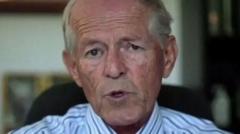The Anglican Church of Southern Africa has publicly apologized for its failure to protect children from the risks posed by John Smyth, a notorious British child abuser who relocated to South Africa in 2001. Smyth, a senior barrister, had already been implicated in the abuse of over 100 children and young men in the UK and Zimbabwe during the 1970s and 1980s, some of which occurred during Christian camps he organized.
In the wake of this revelation, the Archbishop of Canterbury, Justin Welby, resigned last year following the findings of an independent report. This report suggested that both Welby and other church leaders had the responsibility to report Smyth's abusive history to the police, starting in 2013.
Smyth's troubling history dates back to 1982 when a confidential report outlined allegations of his abuse. After moving to Zimbabwe in 1984, Smyth relocated to South Africa in 2001 despite existing suspicions about his behavior. A recent inquiry commissioned by Archbishop of Cape Town, Thabo Makgoba, flagged a significant vulnerability, noting that even though there were no documented cases of abuse in South Africa, there existed a pervasive risk that Smyth could abuse again.
The fresh inquiry indicated that while Smyth was in South Africa, he participated in various church activities that exposed him to young individuals, underscoring the church's failure to implement adequate protective measures. Following an intervention by church leaders around 2003-2004, Smyth left an Anglican community in Durban and later became involved with other Christian groups, which continued to expose children to potential harm until he died in a Cape Town hospital in 2018.
Despite no reports of continued abusive actions while he was in South Africa, the independent investigation concluded that young members of the church were indeed at risk during that time. Archbishop Makgoba acknowledged the church's negligence in safeguarding its congregants and the wider community from this potential threat. He announced an intention to propose significant changes to the church's leadership aimed at preventing recurrence of similar situations in the future.
In the wake of this revelation, the Archbishop of Canterbury, Justin Welby, resigned last year following the findings of an independent report. This report suggested that both Welby and other church leaders had the responsibility to report Smyth's abusive history to the police, starting in 2013.
Smyth's troubling history dates back to 1982 when a confidential report outlined allegations of his abuse. After moving to Zimbabwe in 1984, Smyth relocated to South Africa in 2001 despite existing suspicions about his behavior. A recent inquiry commissioned by Archbishop of Cape Town, Thabo Makgoba, flagged a significant vulnerability, noting that even though there were no documented cases of abuse in South Africa, there existed a pervasive risk that Smyth could abuse again.
The fresh inquiry indicated that while Smyth was in South Africa, he participated in various church activities that exposed him to young individuals, underscoring the church's failure to implement adequate protective measures. Following an intervention by church leaders around 2003-2004, Smyth left an Anglican community in Durban and later became involved with other Christian groups, which continued to expose children to potential harm until he died in a Cape Town hospital in 2018.
Despite no reports of continued abusive actions while he was in South Africa, the independent investigation concluded that young members of the church were indeed at risk during that time. Archbishop Makgoba acknowledged the church's negligence in safeguarding its congregants and the wider community from this potential threat. He announced an intention to propose significant changes to the church's leadership aimed at preventing recurrence of similar situations in the future.
















